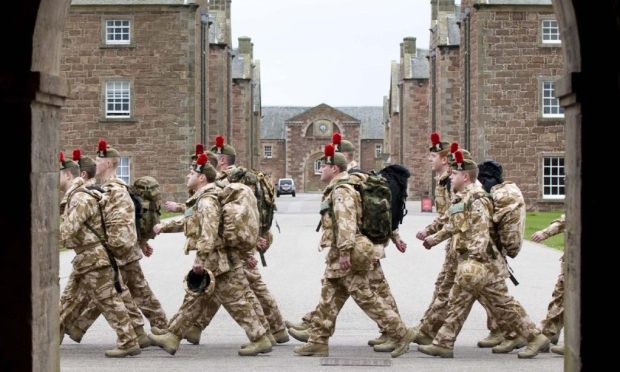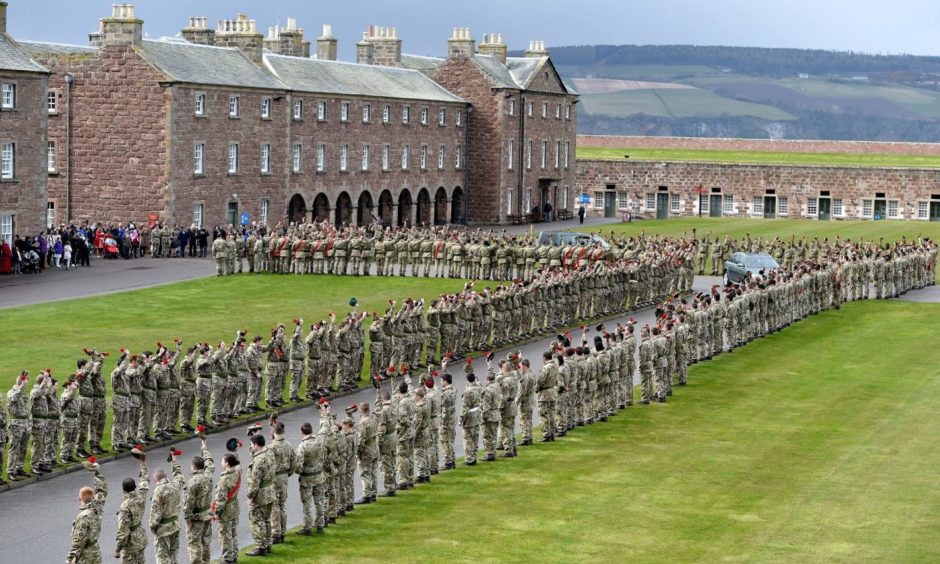The Army recruitment “crisis” in Scotland has been laid bare by new statistics showing the main infantry regiment is under strength by almost a quarter.
The Royal Regiment of Scotland – which includes famous battalions such as The Black Watch and The Highlanders – was 489 troops short of its 2,059 personnel “requirement” last year.
The staffing shortfall was among the largest in the British Army when compared against current targets.
And the actual strength of the regiment has shrunk by 28% over the last five years, from 2,180 troops in 2015 to 1,570 last year.
SNP defence spokesman Stewart McDonald accused the UK Government of overseeing a “recruitment crisis” that has broken promises, reduced capabilities and could now potentially impact on the military’s contribution to the roll-out of coronavirus vaccines.
The Army insisted it had met its recruitment targets for this year, however, and that it continues to actively seek new personnel in Scotland.
Recruitment problems
The figures have been released under freedom of information laws in the wake of a row in November about the future of The Black Watch, which is also known as 3rd Battalion, Royal Regiment of Scotland, or 3SCOTS.
Reports suggested the Fort George-based unit was facing the axe due to recruitment problems, only for Prime Minister Boris Johnson to remove the threat a few days later.
Figures from April show that the Royal Regiment of Scotland was at 76% of its staffing requirement, a larger gap than any other except the Mercian Regiment and the Welsh Guards, which were also at 76%, the Irish Guards at 72%, and the Scots Guards at 69%.
Data broken down by battalion show that The Black Watch (3SCOTS) was 144 personnel short of its 544 requirement in October, while The Highlanders (4SCOTS) was 152 below its target of 632.
The Royal Highland Fusiliers (2SCOTS) was 103 under its requirement of 563, while the Royal Scots Borderers (1SCOTS) was 22 down on its 212 capacity, and the Argyll and Sutherland Highlanders (5SCOTS) was 29 short of its target of 99.
Mr McDonald, the SNP MP for Glasgow South, said: “The UK Government has thrust the Armed Forces into a recruitment crisis at the very time we need the support and resilience they provide.
“Broken Tory promises – like the increase in personnel stationed in Scotland made during the 2014 referendum – impact our capacity and ability to tackle both domestic and global threats, safeguard our safety and security and, importantly, assist with the roll-out the Covid-19 vaccine.
“In stark contrast to Tory cuts, the SNP has proposed an Armed Forces Welfare Commission designed to help personnel develop as professionals, allowing troops to remain grounded in their local communities, and ensuring that the family life and personal wellbeing of military personnel are assured.”
The UK Government said this week that more than 5,000 armed forces personnel were currently deployed to support the pandemic response across Britain, including the use of military advisers to support the testing and vaccine programmes in Scotland.
It is understood that recent progress has been made on recruitment, with applications to join the Army hitting a five-year high in the last financial year and the Infantry Training Centre at Catterick currently full.
A spokesman for the Army said: “The Army met its target for infantry recruitment this year and continues to actively recruit throughout Scotland.
“We continue to have the talent and numbers we need in our armed forces to keep Britain safe.”
‘Tired and inaccurate’ claims
Conservative MP for West Aberdeenshire and Kincardine, Andrew Bowie, said: “Just six weeks after the Prime Minister announced the biggest investment in our Armed Forces since the Cold War, Mr McDonald’s much-rehearsed claims are tired and inaccurate.
“A powerful part of the British Army’s core strength lies in Scotland and recruitment is on the rise. Claims they aren’t trying hard enough are a slap in the face to 10,000 soldiers, sailors and airmen along with 4,000 reservists.
“The SNP’s constant scaremongering betrays their true position in Scotland.
“This is a party that voted to stop recruitment of 16 and 17-year-olds and showed contempt for Army recruiting teams engaging with schools across Scotland.”

